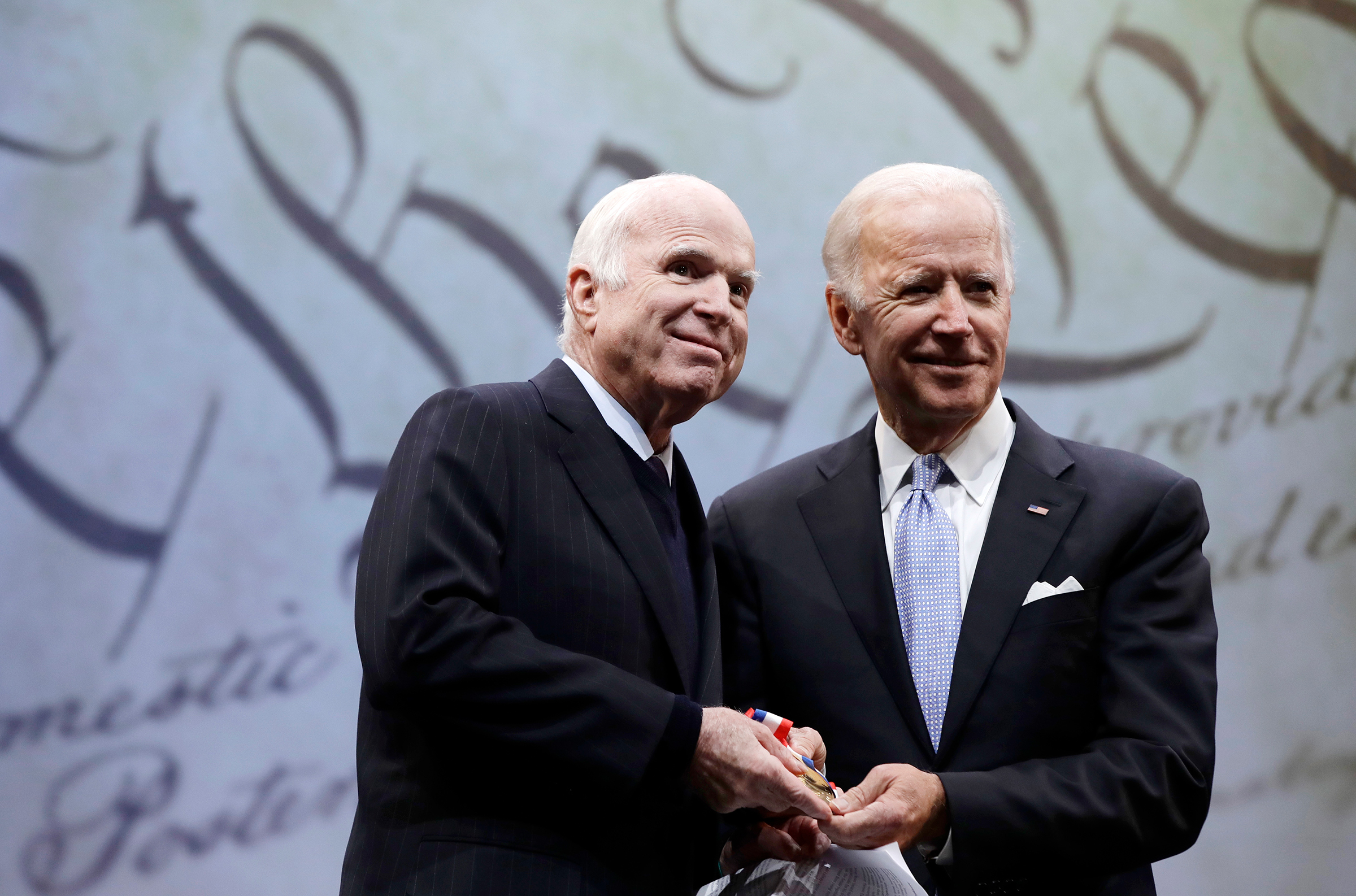
Joe Biden and John McCain were colleagues and friends, their friendship dating back to the 1970s, when Biden was a young senator and Captain McCain was the Navy’s liaison officer to the Senate. They were friends who were often in disagreement on issues that both felt passionate about, and their debates could be heated at times.
One example from their long history comes to mind in this moment. Both men had strong opinions on U.S. policy for the Balkan countries. In the mid-1990s, they were briefly on opposite sides of the question of whether the U.S. should intervene militarily in the Bosnia conflict, with Biden in favor and McCain opposed.
I remember a memorable clash on a Sunday morning talk show when both men appeared close to losing their tempers. I had accompanied McCain to the interview, and came away from it worried that the exchange might have caused lingering hard feelings. On the contrary, McCain seemed unbothered by their argument, remarking during the car ride home that he thought Biden had made some good points that he hadn’t had an answer for. He and Biden had been friends for nearly twenty years by then. They had traveled the world together. Both men were informal and friendly by nature, and enjoyed each other’s company. Both aspired to be statesmen. This was one disagreement among many, but disagreements weren’t barriers to their mutual respect or to friendship.
After consulting with colleagues Joe Lieberman and Bob Dole, who were also prominent advocates for U.S. involvement, and continuing his discussion with his Sunday morning sparring partner, McCain changed his view. He and Senator Dole authored the resolution that authorized the Clinton Administration to deploy American peacekeepers to Bosnia.
It was not a politically easy about-face for McCain to make. At the time, he was the national chairman of Senator Phil Gramm’s presidential campaign. Bob Dole was Gramm’s chief rival for the nomination, and Gramm was outspoken in opposition to sending American soldiers to the Balkans. He asked McCain to refrain from sponsoring the resolution with Dole. McCain rebuffed the request, arguing simply that Dole was right, as were Lieberman and Biden, and Gramm was wrong.
I remember thinking at the time that McCain’s actions reflected well on the Senate as an institution where respectful relationships among its members opened minds to opposing arguments, and encouraged cross party cooperation and problem solving.
I haven’t worked in the Senate for a long time, but like other former Senate staff and members, I despair that its best qualities are being destroyed by hyper-partisanship in these polarized times. Both sides bear some responsibility for the decline, although, I’m sorry to say, in recent years Republicans are the guiltier party.
A case in point is the contemptible behavior of Senator Ron Johnson, Republican from Wisconsin, now in his second term, and Chairman of the Homeland Security Committee. Johnson has used his chairmanship to chase phony conspiracy theories about Joe Biden based on Russian disinformation. Recently on Fox News, Johnson committed one of the most indecent acts by a United States Senator since the passing of the late, unlamented Joe McCarthy. He left the impression that Vice President Biden’s son, Hunter, is involved in child pornography. He offered no evidence at all for this claim which has all the hallmarks of a smear frequently employed by the Kremlin.
Having served there for thirty-five years, Biden is well known and well-liked by senior members of the Senate, many of whom consider him a friend. That, as of this writing, not a single Republican senator has denounced Johnson’s smear is dispiriting to those who hope the Senate might again become a forum for bipartisan problem-solving. The place looks more and more like the intensely partisan House of Representatives, only with longer terms.
There was a time when many senators considered themselves statesmen first, and partisans second. They shared a practical humility that recognized governing was not a zero sum political contest, but a shared responsibility in a legislative chamber that gave no side total power. Making modest progress on the country’s problems was the most they could aspire to in a system such as ours, and there was satisfaction and honor enough in the accomplishment.
John McCain and Joe Biden bridged their differences on Bosnia because they believed they had a responsibility to the Senate and the country to do so, and they continued to argue and work together for decades after that. In 2018, Biden gave a eulogy at Senator McCain’s memorial service, and comforted his late friend’s family.
If we are to return to a time when bipartisan cooperation that serves the public good is welcome again in Senate deliberations, we’ll have to do more than rid ourselves of the narcissist in the White House. We’ll have to elect to the body men and women who don’t promise the moon and deliver only vitriol and stalemate, who view their election as an opportunity to solve problems, not merely deprive the other side of the same opportunity. It will require electing senators who see each other not solely as rivals, but as fellow statesmen and friends, the way John McCain and Joe Biden regarded each other.
More Must-Reads from TIME
- Cybersecurity Experts Are Sounding the Alarm on DOGE
- Meet the 2025 Women of the Year
- The Harsh Truth About Disability Inclusion
- Why Do More Young Adults Have Cancer?
- Colman Domingo Leads With Radical Love
- How to Get Better at Doing Things Alone
- Michelle Zauner Stares Down the Darkness
Contact us at letters@time.com